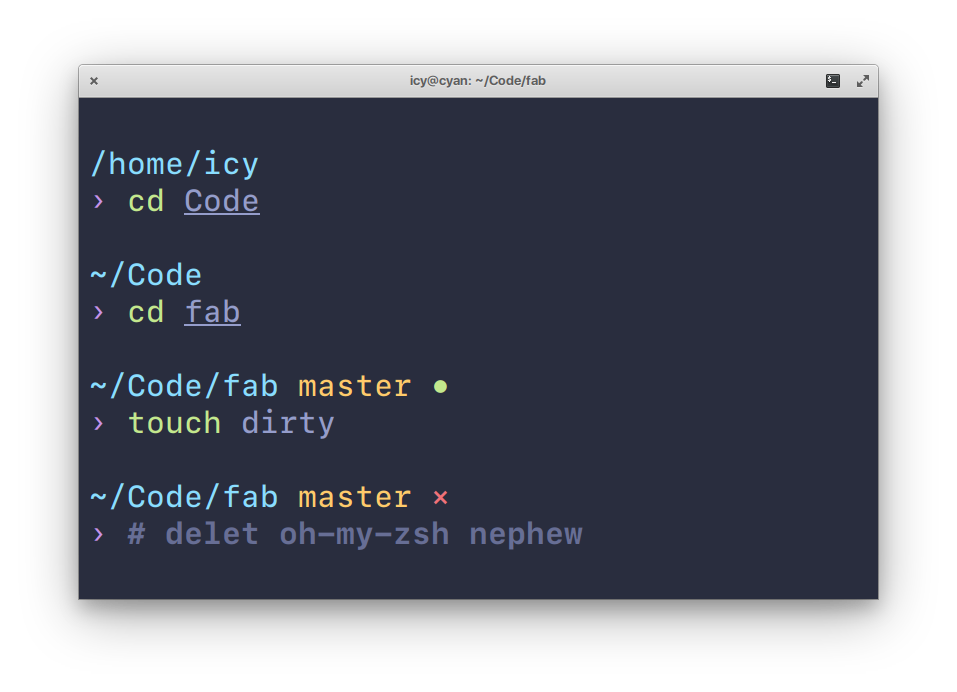https://github.com/icyphox/nicy
:snowflake: a nice and icy zsh and bash prompt in Nim
https://github.com/icyphox/nicy
bash nim prompt shell zsh
Last synced: about 1 month ago
JSON representation
:snowflake: a nice and icy zsh and bash prompt in Nim
- Host: GitHub
- URL: https://github.com/icyphox/nicy
- Owner: icyphox
- License: mit
- Created: 2018-11-13T10:42:01.000Z (over 6 years ago)
- Default Branch: master
- Last Pushed: 2021-08-20T08:22:28.000Z (almost 4 years ago)
- Last Synced: 2024-10-30T06:31:29.799Z (7 months ago)
- Topics: bash, nim, prompt, shell, zsh
- Language: Nim
- Homepage: https://icyphox.github.io/nicy/
- Size: 150 KB
- Stars: 180
- Watchers: 5
- Forks: 8
- Open Issues: 3
-
Metadata Files:
- Readme: readme.md
- License: license
Awesome Lists containing this project
README

> A nice and icy zsh and bash prompt in Nim
[](https://travis-ci.org/icyphox/nicy)

### Why?
I’ve always wanted to minimize my reliance on frameworks like [oh-my-zsh](https://github.com/robbyrussell/oh-my-zsh), so I figured, why not write my own ZSH prompt in my new favourite language? Turned out to be a really fun exercise.
### Highlights
- Written in Nim 👑
- Fast (in theory, since Nim compiles to C)
- Pretty defaults.
- Plugin-like system for prompt customization, in case you didn’t like the pretty defaults.
- Support both zsh and bash.
- Fun, I guess.
## Installation
**Note**: It’s probably a good idea to uninstall `oh-my-zsh`, or any other plugin framework you’re using
altogether. It may cause conflicts.
```console
$ nimble install nicy
```
Don’t know what that is? New to Nim? Check out the Nim [docs](https://nim-lang.org/documentation.html). `nimble` is packaged with Nim by default.
## Quick start
Add this to your `~/.zshrc`. If you installed via `nimble`, set `PROMPT` to `$(~/.nimble/bin/nicy)`.
```zsh
autoload -Uz add-zsh-hook
_nicy_prompt() {
PROMPT=$("/path/to/nicy")
}
add-zsh-hook precmd _nicy_prompt
```
Make sure you disable all other themes.
Nicy supports BASH also, and you could simply add it to your `~/.bashrc` or `~/.bash_profile`:
```bash
function nicy_prompt_command {
PS1=$(/path/to/nicy)
}
PROMPT_COMMAND="nicy_prompt_command"
```
## Configuration
If you want to configure `nicy` as it is, you’ll have to edit the `src/nicy.nim` file and recompile. Messy, I know.
### Build your own prompt
Alternatively, you can just as easily write your own prompt in Nim using `nicy`’s built-in API. Refer to the [Examples](#Examples) section for some insight.
Once you’re done, compile it and add a similar function to your `.zshrc` as above, replacing `PROMPT` with the path to your own binary.
### Examples
```nim
# ‘user@host $’ prompt
import nicy, strformat
let
user = color(user(), green)
host = color(host(), red)
prompt = color("$ ", cyan)
at = color("@", yellow)
echo fmt"{user}{at}{host} {prompt}"
```
```nim
# fish’s default prompt '~>'
import nicy, strformat
let
prompt = color("> ", green)
tilde = tilde(getCwd())
echo fmt"{tilde}{prompt}"
```
```nim
# pure by @sindresorhus (kinda)
import nicy, strformat
let
prompt = color("❯ ", magenta)
tilde = color(tilde(getCwd()), cyan)
git = color(gitBranch() & gitStatus("*", ""), red)
nl = "\n"
echo fmt"{tilde}{git}{nl}{prompt}"
```
```nim
# switching by return code
import nicy, strformat
let
prompt = returnCondition(ok = "👍", ng = "👎") & " "
tilde = color(tilde(getCwd()), cyan)
git = color(gitBranch() & gitStatus("*", ""), red)
nl = "\n"
echo fmt"{tilde}{git}{nl}{prompt}"
# ~ master
# 👍
```
If you like to know more details about git status, you may want to try the following powerful example which is including the number of untracked, modified, staged, conflicted and the number of commits your local branch is ahead, behind, etc:
```
nim c -d:release examples/power.nim
```
### API
**`zeroWidth(s: string): string`**
Returns the given string wrapped in zsh zero-width codes. Useful for prompt alignment and cursor positioning.
All procs below return strings wrapped by this.
**`foreground(s: string, color: Color): string`**
Returns the given string, colorized.
Possible colors are `black`, `red`, `green`, `blue`, `cyan`, `yellow`, `magenta`, `white`.
**`background(s, color: string): string`**
Returns the given string with its background colorized.
Same possible colors as above.
**`bold(s: string): string`**
Makes the given string bold.
**`underline(s: string): string`**
Adds an underline to the given string.
**`italics(s: string): string`**
Italicizes the given text. **May not work in some terminal emulators!**
**`reverse(s: string): string`**
Swaps the foreground/background colors for the given string.
**`reset(s: string): string`**
Resets all attributes. Useful for disabling all styling.
**`color*(s: string, fg, bg = Color.none, b, u, r = false): string`**
Convenience proc that sets all attributes to a given string.
`fg`: foreground, `bg`: background, `b`: bold, `u`: underline, `r`: reverse
**`horizontalRule(c: char): string`**
Returns a string of characters `c`, having the length of the current terminal width. Useful for positioning right-side prompts.
**`tilde(path: string): string`**
If `path` starts with `/home/user`, it is replaced by a `~/`.
**`getCwd(): string`**
Returns the full path of the current working directory, or returns the string `[not found]` if current path doesn’t exist. (eg: `rm -rf ../curpath`)
**`virtualenv(): string`**
Returns the current virtualenv name if in one.
**`gitBranch(): string`**
Returns the current git branch, if in a git directory.
**`gitStatus(dirty, clean: string): string`**
Returns either `dirty` or `clean` if in a git repository. For example, return `•` if clean and `×` if dirty.
**`user(): string`**
Returns the current username.
**`host(): string`**
Returns the current hostname.
**`returnCondition*(ok: string, ng: string, delimiter = "."): string`**
If the return code is `0` then returns `ok` string, otherwise `ng`.
**`returnCondition*(ok: proc(): string, ng: proc(): string, delimiter = "."): string`**
Returns result of `ok` proc or `ng` proc.
If the return code is `0` then this proc calls `ok` proc, otherwise calls `ng` proc.
**`shellName*: string`**
Contains the name of shell in which your prompt progoram is running.
Currently it may be `zsh` or `bash`.
You can specify it during compilation using the switch `-d:zsh` or `-d:bash`, or you can let the program detect it automatically, which may slow it down by a few milliseconds.
#### GitStats API
**`newGitStats*(): GitStats`**
Returns a `GitStats` object which contains the name of the local branch, the name of remote reference, number of commits your local branch is ahead or behind remote ref, number of untracked, modified, staged, conflicted, and the number of stashed changes.
**`branch*(gs: GitStats, detachedPrefix = "", postfix = " "): string`**
Returns the current git branch name.
**`status*(gs: GitStats, ahead, behind, untracked, changed, staged, conflicted, stash: string, separator, postfix = " "): string`**
Returns the git status string.
**`dirty*(gs: GitStats): bool`**
Returns whether the current directory has been changed.
## Contributing
Bad code? New feature in mind? Open an issue. Better still, learn [Nim](https://nim-lang.org/documentation.html) and shoot a PR :sparkles:
## License
MIT © [Anirudh Oppiliappan](https://icyphox.sh)